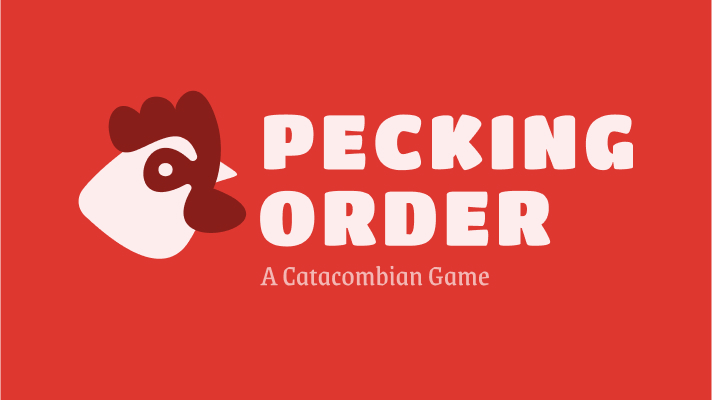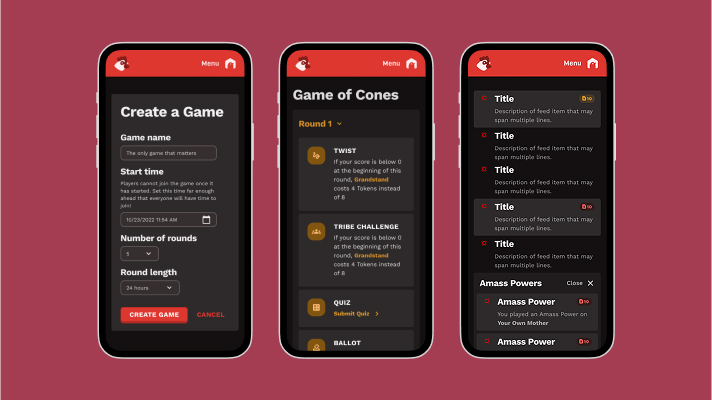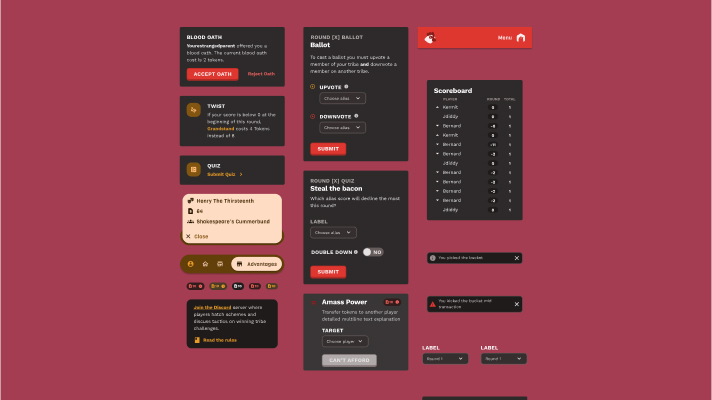The Challenge
We set out to solve a specific problem in the digital social gaming space. During the pandemic, people craved meaningful social interaction, but existing games fell into two extremes: shallow party games that lasted minutes, or complex MMORPGs requiring massive time investments.
The Gap: No games captured the strategic depth and genuine social dynamics that make Survivor compelling—the week-long relationship building, alliance formation, and strategic gameplay that creates authentic human connections.
Initial Constraints
- Limited development resources (friends working in spare time)
- Need for real-time social interaction and voting
- Managing complex game economics and player progression
- Week-long engagement without losing player interest
Research & Discovery
Understanding the Source Material
We analyzed what makes Survivor compelling: social voting dynamics, resource management, alliance formation, and the balance between strategic gameplay and social relationships.
Daily Challenge Integration
The game operated on a consistent daily rhythm:
- Daily Challenge: Varied objectives like "be part of the biggest tribe" or "predict which player receives the most upvotes"
- Voting Ballot: Core upvote/downvote mechanics that determined player rankings
- Tribal Challenges: Periodic team-based competitions that could shift alliances and power dynamics
These elements created multiple strategic layers—players had to balance individual performance, social positioning, and team dynamics simultaneously. Challenges integrated directly with the currency system, providing rewards that funded the economic actions that drove social gameplay.
Solution Evolution
Phase 1: Google Sheets Prototype
Why we started here: Google Sheets offered the perfect rapid prototyping environment—real-time collaboration, built-in data structure, and zero development overhead.
The "Probst" System: One player served as the game master, managing the master spreadsheet while other players accessed individual sheets with 4-digit password protection.
Phase 2: Web App Development
Why we made the transition: Google Sheets became increasingly fragile as we added complex logic for scoreboard validity and game mechanics. A single typo could break the entire spreadsheet.
Technical Solution: Migrated to Laravel web application with proper error handling and robust architecture.
Phase 3: Complete UX Redesign in Figma
From the Google Sheets prototype through the Laravel web app, I designed the entire user experience from scratch:
Core User Flows:
- Authentication & Onboarding: Login system and new player introduction
- Daily Mechanics Interface: Streamlined voting, challenge participation, and action selection
- Live Scoreboard: Real-time player rankings and status updates
- Social Feed: Public activity stream for announcements and game events
Design Philosophy: We kept external communication in Discord while focusing the app on core game mechanics. This created clear separation between social strategy (Discord) and game actions (web app), reducing interface complexity while maintaining rich social dynamics.
Visual Design & Branding

Custom logo design establishing the game's visual identity
Game Interface Design

Clean interface balancing complex game mechanics with user accessibility
Strategic Gameplay Elements

Strategic voting and alliance mechanics designed for week-long social gameplay
Key Design Decisions
Game Economics Design
The currency system created rich strategic depth through multiple spending options:
Offensive Actions:
- Vote Blocking: Prevent another player's vote from counting
- Vote Amplification: Cast multiple votes in a single round
- Public Shaming: Post callouts in the public feed
Information Warfare:
- Identity Spying: Reveal other players' hidden roles
- Intelligence Gathering: Access voting intentions
Defensive Tools:
- Immunity Purchases: Protection from elimination votes
- Counter-Intelligence: Block spying attempts
The economy had to balance power (expensive actions felt impactful) with accessibility (everyone could participate meaningfully). Early versions suffered from runaway leaders until we implemented diminishing returns on consecutive actions.
Social Interaction Framework
Meaningful Connection Through Mutual Need: Rather than forcing social features, the game design created natural interdependencies. Players needed alliances to succeed in challenges, votes to avoid elimination, and strategic cooperation to maximize their position.
The challenges provided a "cradle for mutual need" that allowed authentic relationship building to emerge organically. Most remarkably, two players who didn't know each other before the game developed a relationship through gameplay and are now engaged to be married—demonstrating that the game mechanics successfully created conditions for genuine human connection.
Results & Impact
Memorable Game Moments
- The "HugeInfoDumps" Incident: Players created fake accounts to blast information and create chaos, leading to new identity verification systems
- Blood Oath Alliances: Secret partnerships formed in the final hours, with dramatic last-minute promises and betrayals
- The Great Economic Upset: Unknown players rocketed from last place to first in the final round through strategic currency deployment
Current Evolution: Conference Engagement Tool
The platform was successfully adapted for John's product consulting company as a conference engagement tool. The streamlined version focuses on core voting and challenges, removing the complex economic advantages for the professional environment while keeping Blood Oaths as an optional "expansion" game mode that players can choose upfront for more intense gameplay.
Challenges & Solutions
Technical Constraints
Challenge: Google Sheets couldn't handle increasingly complex features without becoming fragile—a single typo could crash the entire game mid-session
Solution: Migrated to Laravel web application with proper error handling, data validation, and robust architecture
Balancing Game Economics
Challenge: The original voting economy created dramatic endgame swings that felt disconnected from week-long strategic play
Solution: Simplified automatic vote mechanics and added diminishing returns to prevent dramatic last-minute position changes
What I'd Do Differently
- Simplify Advantage Complexity: The economic advantages were overwhelming for non-competitive players. I'd design clearer onboarding and possibly tier the complexity
- Address "King Making" Dynamics: Competitive players would secure votes from others by promising reciprocity in future games, creating frustration for excluded players
- Balance Social Drama vs. Accessibility: While emergent social gameplay was entertaining, clearer guidelines about acceptable behavior would help maintain inclusive participation